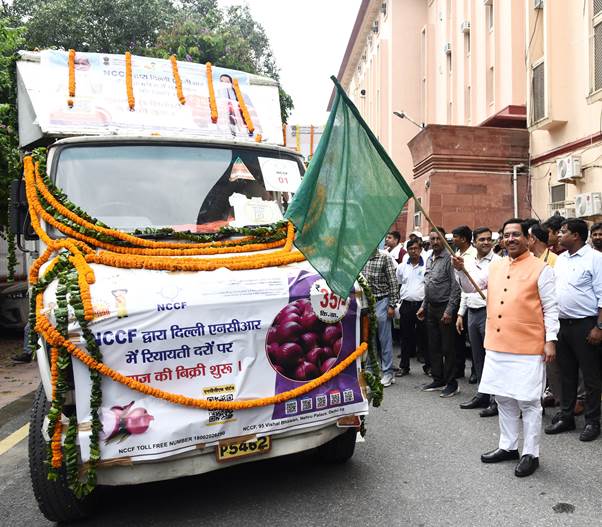Food and Consumer Affairs Minister Shri Pralhad Joshi Flags Off Mobile Vans Selling Onions at Rs. 35 per kg

Food and Consumer Affairs Minister Shri Pralhad Joshi Flags Off Mobile Vans Selling Onions at Rs. 35 per kg. On September 5, 2024, Shri Pralhad Venkatesh Joshi, the Union Minister of Consumer Affairs, Food, Public Distribution, and New and Renewable Energy, took a major step towards controlling food inflation. He flagged off mobile vans selling onions at Rs. 35 per kg. The initiative aims to ensure that consumers can access this essential vegetable at affordable prices. The National Cooperative Consumer’s Federation of India Ltd. (NCCF) and the National Agricultural Cooperative Marketing Federation of India Ltd. (NAFED) have been mobilized for this purpose.
Food and Consumer Affairs Minister Shri Pralhad Joshi Flags Off Mobile Vans Selling Onions at Rs. 35 per kg
Food and Consumer Affairs Controlling Onion Prices: A Government Priority
In recent months, onion prices have been on the rise, contributing to food inflation. The Government of India, recognizing the critical role onions play in the daily diet of millions, has launched this initiative to stabilize prices. Shri Pralhad Joshi, during the flag-off event, emphasized that controlling food inflation is one of the top priorities of the government. By deploying mobile vans and selling onions at Rs. 35 per kg, the government aims to provide relief to consumers struggling with rising vegetable prices.
Key Points:
- Retail sale of onions at Rs. 35 per kg: The government is selling onions through mobile vans at an affordable rate.
- Part of a larger strategy: This move is part of the government’s ongoing efforts to control food inflation.
- Buffer stock release: The calibrated and targeted release of onion stocks from the government’s buffer ensures a steady supply to the market.
Onion Buffer Stock: 4.7 Lakh Tonnes from Rabi Crop
One of the key elements of the government’s strategy to stabilize onion prices is its buffer stock. As of now, the buffer stock of onions stands at 4.7 lakh tonnes, primarily sourced from the Rabi crop. This stock allows the government to release onions into the market as needed, preventing shortages and curbing price hikes.
Importance of Onion Buffer Stock:
- Price stabilization: The buffer stock helps regulate prices by ensuring a steady supply of onions in the market.
- Timely intervention: When prices rise due to shortages, the government can release onions from the buffer to bring prices down.
- Relief to consumers: The buffer stock ensures that consumers are not hit hard by sudden price hikes.
Distribution Through Multiple Channels
The retail sale of onions at Rs. 35 per kg is being carried out through various channels to reach a wide range of consumers. These include mobile vans, e-commerce platforms, and outlets of organizations like Kendriya Bhandar and SAFAL. This multi-channel approach ensures that onions are available to consumers across the country, regardless of their location.
Food and Consumer AffairscDistribution Channels:
- Mobile vans: NCCF and NAFED have deployed mobile vans across cities to sell onions at affordable prices directly to consumers.
- Retail outlets: Outlets of Kendriya Bhandar and SAFAL are also selling onions at the same price.
- E-commerce platforms: Consumers can also buy onions online through selected e-commerce platforms, making it convenient for those who prefer online shopping.
Government’s Direct Interventions to Control Food Inflation
Shri Pralhad Joshi highlighted that the government has been taking several direct measures to control food inflation. These include price stabilization initiatives and timely interventions in the market. The sale of onions at subsidized rates is one such measure. By controlling the prices of essential commodities like onions, the government ensures that consumers do not face undue financial burden.
Key Government Interventions:
- Price stabilization fund: This fund is used to support interventions in the market to stabilize prices of essential commodities.
- Timely market interventions: The government releases stocks from its buffer at crucial times to prevent price spikes.
- Targeted measures: The government focuses on essential food items like onions, pulses, and cereals to control inflation.
Impact on Consumers
The sale of onions at Rs. 35 per kg provides much-needed relief to consumers. With rising food prices, families across the country have been feeling the pinch. This initiative not only makes onions more affordable but also sends a message that the government is actively working to curb inflation.
Benefits for Consumers:
- Affordability: Onions, a staple in Indian kitchens, are now available at a reasonable price.
- Easy access: With mobile vans, retail outlets, and online platforms, consumers can buy onions conveniently.
- Financial relief: By stabilizing onion prices, the government is helping families manage their food budgets more effectively.
Government’s Long-Term Strategy for Food Security
The government’s efforts to control food inflation are part of a broader strategy for ensuring food security in the country. By maintaining buffer stocks of essential commodities like onions, the government is prepared to step in whenever market conditions lead to price fluctuations. This long-term strategy not only protects consumers from price shocks but also ensures that essential food items remain accessible to all.
Key Aspects of the Government’s Strategy:
- Building buffer stocks: The government builds buffer stocks of essential commodities during harvest seasons to ensure availability during lean periods.
- Targeted interventions: The government releases stocks from its buffer as needed to stabilize prices.
- Focus on essential commodities: Onions, pulses, and cereals are key focus areas for price stabilization measures.
Role of NCCF and NAFED in Price Stabilization
The National Cooperative Consumer’s Federation of India Ltd. (NCCF) and the National Agricultural Cooperative Marketing Federation of India Ltd. (NAFED) play a crucial role in the government’s price stabilization efforts. Both organizations are responsible for procuring, storing, and distributing onions and other essential commodities. By deploying mobile vans and coordinating with retail outlets, NCCF and NAFED ensure that onions reach consumers at affordable prices.
NCCF and NAFED’s Contribution:
- Procurement: Both organizations are involved in procuring onions from farmers, ensuring fair prices for producers.
- Distribution: NCCF and NAFED manage the distribution of onions through mobile vans, retail outlets, and e-commerce platforms.
- Price regulation: By maintaining a steady supply of onions, these organizations help regulate prices and prevent market fluctuations.
Positive Market Impact
The government’s initiative to sell onions at Rs. 35 per kg is expected to have a positive impact on the market. By releasing buffer stocks and making onions available at affordable prices, the government is likely to bring down prices in the open market as well. This move will also discourage hoarding and black market activities, ensuring that onions remain accessible to all.
Market Impact:
- Lower prices: The retail sale of onions at Rs. 35 per kg is expected to bring down prices in the market.
- Reduced hoarding: The availability of onions at affordable prices will discourage hoarding and speculative activities.
- Stabilized supply: The release of buffer stocks will ensure a steady supply of onions in the market, preventing shortages.
Conclusion
The government’s decision to sell onions at Rs. 35 per kg through mobile vans, retail outlets, and online platforms is a significant step towards controlling food inflation. By releasing buffer stocks and ensuring a steady supply of onions, the government is providing much-needed relief to consumers. This initiative reflects the government’s commitment to keeping essential food items affordable and accessible to all.
As the country continues to face inflationary pressures, targeted measures like these are crucial for stabilizing prices and ensuring food security. With the active involvement of organizations like NCCF and NAFED, the government is well-equipped to manage market fluctuations and protect consumers from price shocks.











